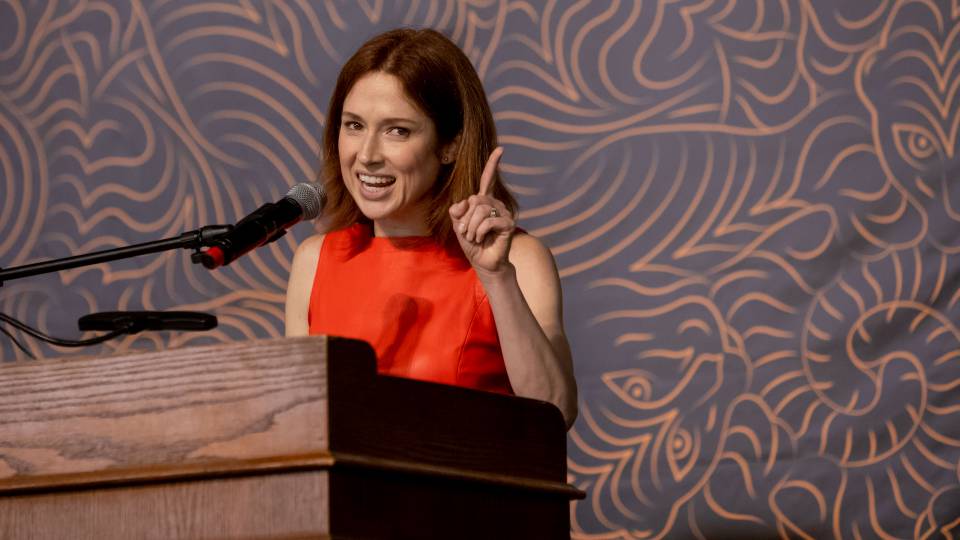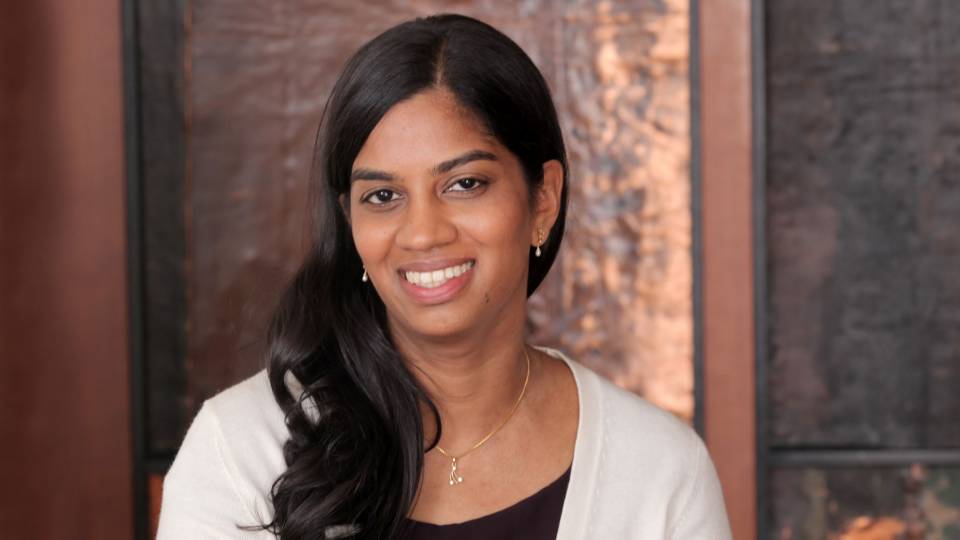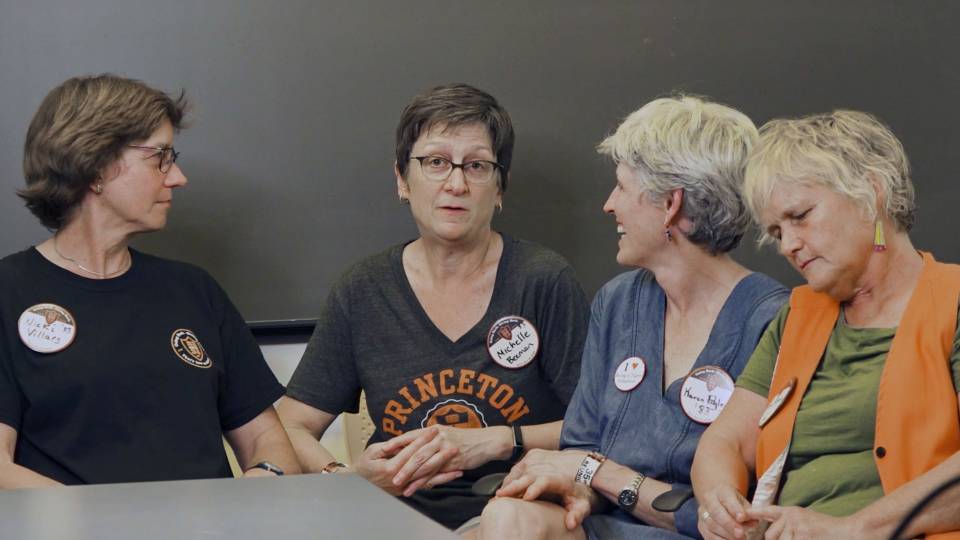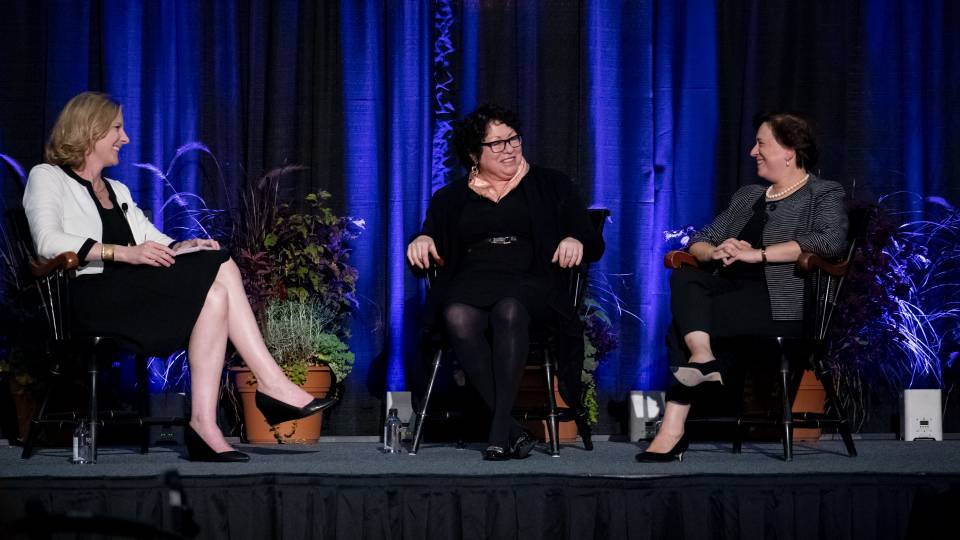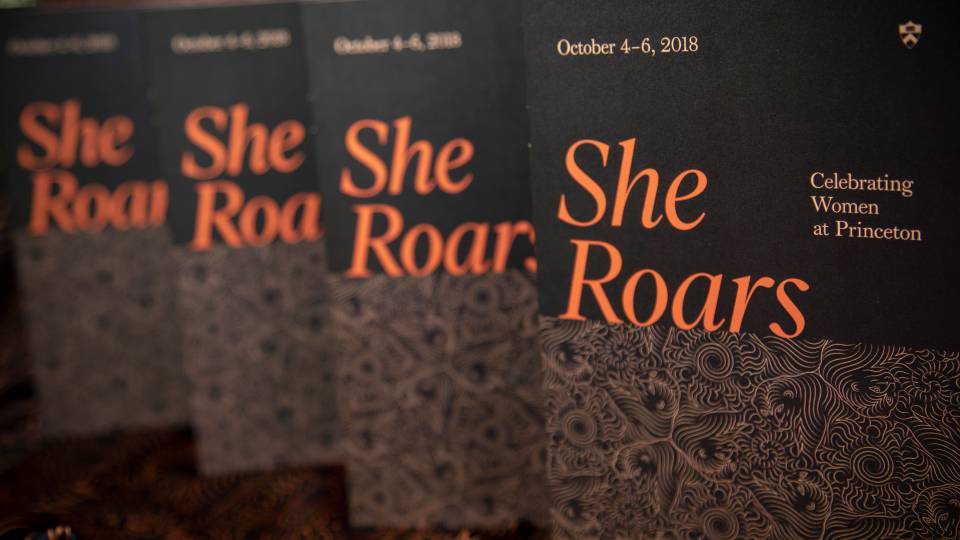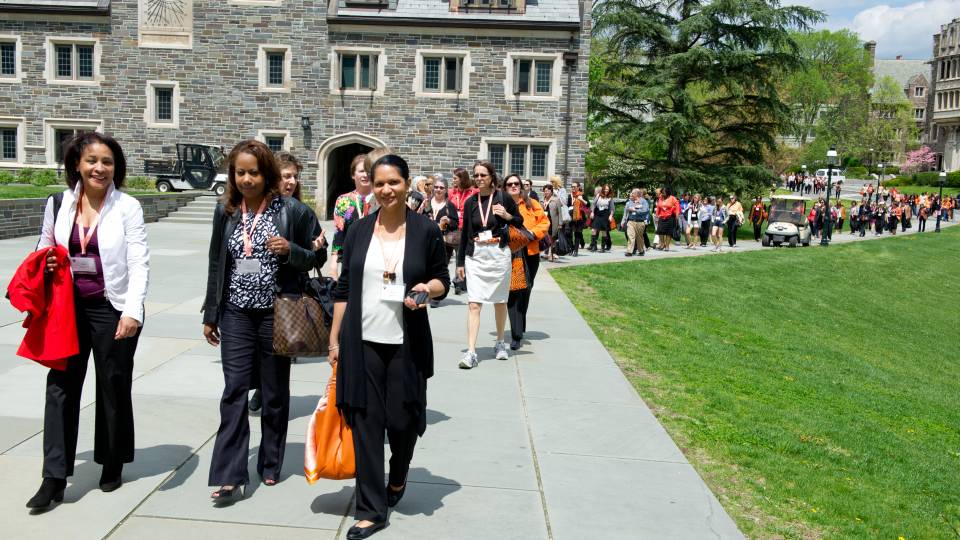Alumnae gather at the Poe Field tent for a luncheon and conversation on Saturday, Oct. 6.
Saturday, Oct. 6, continues to roar at "She Roars" with events from breakfast to dinner. Panels, small-group discussions and receptions fill day three; below are some highlights. See also highlights from days one and two.
At the "FLI is Fly" reception at Prospect House, first-gen, low-income alumnae from across the decades chatted with current FLI students.
Khristina Gonzalez, associate dean of the college and director of programs for access and inclusion, said she was most excited for current FLI "students to see they are enveloped in a community of care and that alumnae want to come back and connect with them. It's a self-sustaining miracle."

First-generation, low-income (FLI) alumnae from across the decades reunite with friends and share memories of their time at Princeton with current FLI students.
Jona Mojados of Philadelphia, a first-gen member of the Class of 2020, who attended Princeton's Freshman Scholars Institute (FSI) — an eight-week summer program that provides a select group of incoming students with an early opportunity to experience the many academic and co-curricular resources that Princeton has to offer — remembered the first day of FSI. "We were all put together in one room and had to design a water bottle — we ended up talking about the different paths that brought us to Princeton. It was a great feeling to get all that energy — it was my first community at Princeton!"
Mojados also attended the Leadership Enterprise for a Diverse America (LEDA) Career Institute, a summer five-day intensive course for exceptional students from under-resourced backgrounds at colleges across the country, held each summer at Princeton. "The FSI and LEDA students are still a great community and a great support system for each other," she said.
Gonzales and her staff also co-coordinate the Mellon Mays Undergraduate Fellowship Program, which identifies highly qualified underrepresented students and other students who have demonstrated a commitment to diversity and provides them with support and mentorship as they prepare themselves for doctoral programs and careers in the professoriate. — Jamie Saxon

Alumnae enjoy refreshments and networking in a gallery at the Princeton University Art Museum during the Affiliated Group Reception, hosted by the Asian American Alumni Association, Association of Black Princeton Alumni, Association of Latino Princeton Alumni and FFR/Princeton BTGALA.
Emily Carter welcomed alumnae to a reception for the School of Engineering and Applied Science at the Friend Center convocation room. "Let us start by recognizing that the engineering school had a really good week," Carter said, noting that two of the Nobel Prizes announced this week went to women associated with the school.
Frances Arnold of Caltech, who earned her undergraduate degree at Princeton in 1979 in mechanical and aerospace engineering, won the Nobel Prize in Chemistry, while Donna Strickland, who had been a research staff member, won the Nobel Prize in Physics.
Carter contrasted the start of coeducation at Princeton, when there was one female engineering student in the first class of women who graduated in 1973, and today, when the last two years have set records for the percentage of women in the first-year class at 43 and 44 percent, respectively. Overall, she said about 38 percent of all undergraduates in engineering are women, 28 percent of the graduate students and 17 percent of the faculty. "So you see there is a drop-off," she said, emphasizing that she wants to boost the numbers to 50 percent at all levels.

Alumnae attend a reception at the School of Engineering and Applied Science on Saturday, where Dean Emily Carter recognized that women are making "a huge difference in the life and the direction of the school, but we have much more to do."
Carter also noted that, in addition to her being the second female dean of engineering, two of the school's six department chairs and directors of two of the school's four major interdisciplinary centers are women.
"So women are here, making a huge difference in the life and the direction of the school, but we have much more to do," she said.
Carter outlined numerous initiatives at all levels to better attract, retain, inspire and propel women and underrepresented groups at all levels in the school.
"All of these efforts have made our community a more welcoming one," she said. The future for women in engineering is bright, Carter concluded. "I firmly believe our mission resonates with young women: Create, Educate and Serve. Engineering involves creativity and teamwork. … Engineering, as I think of it, is science in the service of society. Women care about making the world a better place.
"I truly believe that the school of engineering at Princeton can help them — the women who want to make the world a better place — achieve their dreams, and my dream is to make that happen for them." — Steven Schultz

She Roars attendees fill the Chancellor Green Rotunda to attend the Alumnae Author Book Fair.

In the foreground, attendees chat with alumnae authors about their published work, as other alumnae browse volumes from dozens of authors featured at the book fair.

From left, Laura Forese '83, executive vice president and chief operating officer of NewYork-Presbyterian and University trustee, speaks during a panel on shaping health care policy as Michelle Williams '84, dean of the faculty of the Harvard T.H. Chan School of Public Health, and Ann Kurth '84, dean of the Yale School of Nursing, listen intently.

At the panel discussion "Prescribed or Proscribed? The Shaping of Health Care Policy: Reproductive Rights, the Opioid Epidemic, Insurance Access and Other Critical Conditions," Jahdziah St. Julien '18 asks a question as fellow conference attendees look on in McCosh Hall.
On Poe Field, around 3,000 alumni gathered for a luncheon and conversation with Princeton's 19th president. “Shirley Tilghman needs no introduction,” said Deborah Prentice, provost and the Alexander Stewart 1886 Professor of Psychology and Public Affairs, as the crowd under the tent rose to its feet to cheer the former president.
“We attract to this university — and it’s represented in this tent — some of the most ambitious and talented women in the world,” said Tilghman. “And they come here absolutely believing that they can do anything they want. … What I worry about is whether we are honestly preparing them for the world they are going to face outside the orange bubble.”

From left, Sally Blount ’83 and Princeton president emerita Shirley M. Tilghman take questions from the audience during a luncheon on Poe Field.
She discussed how higher education has welcomed women more quickly than the business world. Within 25 years of coeducation, Ivy League schools were at 50 percent female enrollment; by contrast, the first female executive became a chief executive officer in 1972, and almost 50 years later, “we’re at 6.4 percent of CEOs,” said Sally Blount of the Class of 1983, the Michael L. Nemmers Professor of Strategy and former dean at the Kellogg School of Management at Northwestern University.
“We’re crushing it in education,” Blount said. “The doors were opened, and in 25 years, we’re outperforming. We can do it. But we have to work together more than we have to help women in the workplace.”
And the reason why hasn’t changed, they agreed: “It’s about daycare, stupid,” said Tilghman, who is also a professor of molecular biology and public affairs, quoting remarks she made years ago. “It’s at the heart of things.”
Blount said Princeton and its fellow institutions need to take concrete steps to prepare female students for “when the nanny quits, for when you have a #MeToo moment you can’t tell anyone about,” she said. “We’ve got to give women strategies so that when the predictable crises come, they’re not solving it by themselves.”
Tilghman also asked Blount about implicit bias and how to overcome it.
"The first step is really a deep humility that all of us are biased and are doomed to be, as humans, with the brains that we were given,” said Blount. The other key, she said, is choosing “social identities that unify us.” She gestured to the thousands of alumni gathered under the tent and said that despite the many races, genders, political leanings and other potentially divisive identifiers present, “Boy are we feeling unified today [by] that amazing Princeton identity!”

Toward the end of the luncheon, Georgia Nugent ’73 takes the stage to read a statement for approval from attendees, concluding, "What benefits women benefits everyone."
When Tilghman and Blount opened the conversation to questions, Georgia Nugent, Class of 1973, a former provost of Princeton and president emerita of Kenyon College, presented a statement for approval by acclamation: "More than 3,000 women are gathered here today. We are deeply grateful to the University for bringing us together. Although we are all Princeton alumnae, we are diverse in age, background, race and ethnicity, geographical origin, sexual orientation, ability, political affiliation, and in the paths our lives have taken. But we are united in our advocacy, particularly at this moment in our national life, for the importance of women’s voices being heard, respected and acted upon. 'She Roars' is an apt title for our gathering. We want to affirm the energy and power of women speaking together and on each other’s behalf, recognizing — as Nancy Malkiel said yesterday, and as the experience of this University has dramatically shown — that what benefits women benefits everyone."
The acclamation was immediate and enthusiastic, as the alumnae rose to their feet and cheered. — Liz Fuller-Wright
If not much seems to have changed with women reaching the highest leadership positions in business and society, there is one thing that has changed — the conversation around it, said Nancy Peretsman, Class of 1976.
Peretsman, managing director of Allen & Company LLC and former Princeton trustee, joined fellow alumnae on a panel discussion at McCosh Hall titled “The Glass Ceiling and Beyond.”
“I’ve been listening to these conversations for 44 years,” she said. “The last handful of years is truly a different place, if that gives you any comfort.”
What has changed specifically is greater accountability to outside forces including shareholders, who are demanding to see more women on corporate boards, for instance.
Aside from barriers both overt and subtle, one of the main obstacles for many women continues to be flexibility around family responsibilities, the panelists said.
They also agreed that men need to be brought into the conversation. “It’s important for women to realize men want to be part of these discussions, but they’re afraid,” said Arielle Patrick, Class of 2012, senior vice president for Edelman.
Progress might continue to be slow, but there’s one place women always can find support, said Betsy Kenny Lack, Class of 1983, head of global brand strategy for Snapchat.
“I know there’s always been a boys' club, but there’s a girls’ club, too,” Lack said. “Your club is in this room.” — Denise Valenti

From left, Betsy Kenny Lack ’83, Arielle Patrick ’12, Nancy Peretsman ’76 and Alison Ryscavage ’83 participate in a discussion with moderator Anilu Vazquez-Ubarri ’98 on the glass ceiling for women seeking leadership positions.
Social good and profits need not be at cross-purposes in the business world, according to panelists at a session titled “When Purpose Leads to Profits: Making Corporate Social Responsibility a Business Imperative.”
Toni Townes-Whitley, Class of 1985, who serves as president for U.S. regulated industries at Microsoft, and Carla Vernón, Class of 1992, president of the natural and organic operating unit at General Mills, detailed how they and their companies are incorporating social responsibility into their business model and why it’s important, if not critical in modern society.
Vernón said she has made the concept of a triple bottom line — people, planet and profits — a firm expectation in her group.
“My team can’t bring a business plan to me unless I know how it benefits the communities we serve and I know how it takes care of the environmental assets we utilize, because I don’t believe we can actually win in this current expectation — what consumers are expecting from brands,” she said. “I don’t think we can be financially viable unless we do those two things in a compelling way.”
In answer to an audience question, Townes-Whitley said it’s imperative to have principles in place before moving ahead with business plans in any industry. That’s been especially true in her sector, technology, where developments can have far-reaching and unexpected implications.
“You have to have principles in advance because you don’t have time to build principles along the way,” she said. — Denise Valenti
Don’t limit yourself.
That was one of the repeated messages from the alumnae panel on “Liberating the Ph.D.: Diverse Career Paths with a Doctorate,” where the speakers emphasized the need to recognize all of the many skills that come with completing a doctorate, all of which are needed in any career path: Stamina. Persistence. Problem solving. Creative and critical thinking.
As graduate students, “you learned how to identify the biggest question out there, and how to create a plan to solve it,” said moderator Sabine Petry, an assistant professor of molecular biology at Princeton. “Go out in other professions and use your scientific tools on other problems in the world.”
The panelists talked about choosing whether or not to pursue a postdoc, planning a career path and balancing family with careers. “Choose wisely when you choose a partner,” said 1999 graduate alumna Patrice Jean, an intellectual property partner with Hughes Hubbard and Reed LLP who has argued and won three cases before the Supreme Court. “You’ve got to find someone who’s going to be a true partner with you.”
When discussing the challenges she has faced, Jean said bluntly, “The biggest challenge has been that I am a black woman. … But it’s about learning how to use it as a positive.” To laughter, she described a time when opposing counsel revealed their entire case strategy as she sat in the courtroom, because they didn’t realize she was a lawyer.
Now more than ever, a career is made of many small steps instead of one key decision, said several panelists. At those critical moments, take advantage of the Princeton network, said 2011 graduate alumna Shin-Yi Lin, a postdoctoral fellow at Rowan University. “One of the privileges of having come to Princeton is being plugged into this world … which can help at any transition you want to make.” — Liz Fuller-Wright
At a panel on the “Global Rights of Girls and Women,” moderator Denise Raquel Duning, a 2001 graduate alumna and founder and executive director of Rise Up, said, “Nobody shows up for She Meows. We’re here for She Roars,” and asked the four panelists to “do a little bit of roaring” about what is driving their work.
“I am roaring mad,” said Denise Burgess, Class of 1984, a consultant and the CEO of the Girl Scouts of Eastern Massachusetts, who has lived and worked around the world. “We must be strong, forceful — we cannot accept ‘No,’ ‘Wait your turn,’ ‘Maybe later.’ We’ve heard all those before.”

From left: Bindiya Patel *02, Denise Burgess ’84, Cynthia Drakeman ’02, Suman Sureshbabu *07 and moderator Denise Raquel Dunning *01 lead a fiery session on the rights of women and girls in the U.S. and around the world.
Suman Sureshbabu, a 2007 graduate alumna who is associate director of the Rockefeller Foundation, echoed a common theme of the panel when she spoke of the vital need to listen to the voices of the members of the community you are working in. “Who’s really at the table? Are we making space to make sure the right voices are represented?”
“Women’s rights are at the heart of women’s economic advancement,” said Cynthia Drakeman, Class of 2002, chief executive officer of Double X Economy. “How do you know you have rights? You can exercise them freely and without fear of reprisal.”
Bindiya Patel, a 2002 graduate alumna and senior director of planning and design for Global Health Programs, laid out two tangible steps every woman can take: “Find a younger woman you know and help her find her power, and use her power. … Our girls are shrinking. We need to use what privilege and resources and power we have to help younger women expand. Second, find an organization or person you want to support and support them,” whether financially, by getting on the board, contributing to strategic planning, or in any other way.
Burgess laid a call to the alumnae in the room: “To whom much is given, much is expected. And every person sitting in this room has been given a lot. We all have an incredible education. … As Princeton women, we have to stand up — have our voices heard.” — Liz Fuller-Wright
Barely a seat was left in the 250-seat auditorium of the Friend Center at 9 a.m. for a panel discussion "Data Science: A View to the Future."
"Data science is transforming every human endeavor and every academic discipline," said Jennifer Rexford, Class of 1991 and chair of the Department of Computer Science said as she introduced a panel of three leaders in scientific, national security and business uses of data science.
Rexford said this explosion of influence is happening because of the confluence of three factors: massive and diverse sets of data that are available from text, images, video, sensors and scientific instruments; computing and storage machinery that can analyze these data at very large scales; and the development of artificial and machine learning techniques "that have made it possible to convert that raw data into insight, and knowledge and better decisions."

Computer scientist Jennifer Rexford ’91 (at lectern) moderates a panel on data science, joined by, from left, Patricia Falcone ’74, Jennifer Chayes *83 and Courtney Monk ’01.
The conversation and a vigorous question-and-answer-session ranged from exciting emerging areas in the field to questions of privacy and security and how to bring a more diverse group of people into data science.
"Data science is critical for just about everything we do," said Patricia Falcone, Class of 1974, deputy director for science and technology at the Lawrence Livermore National Laboratory. She said the lab analyzes data from around the world, from scientific measurements to social media data, to look for nuclear proliferation and other threats to national security.
Jennifer Chayes, who earned her Ph.D. in physics from Princeton in 1983, described her career going from academic research as a professor of mathematics to Microsoft where she founded a theoretical research group and now directs Microsoft Research labs in New England, New York City and Montreal. She said the Microsoft Research work spans from economics to social media to biomedicine, including harnessing the immune system to fight cancer.
"If any of you are young enough or have kids who are young enough to be thinking about what they might want to do in this world, doing data science in biomedicine is going to be one of the most exciting fields of the next few decades," Chayes said.
Courtney Monk, Class of 2001, did research and analysis for the nonprofit Teach for America for nearly six years before joining the education technology company Chegg, where she is a data scientist doing business analysis. She said her Ph.D. in economics afforded her a surprisingly good foundation for data science because of its heavy use of statistics. "My pro tip for any of you who say 'I can't do data science because I don't know anything about machine learning' — two things: it's not all machine learning; it's all just statistics."

The audience fill the seats in Friend Center to participate in a conversation about data science and how it is “transforming every human endeavor and every academic discipline,” as Rexford stated.
The panelists agreed on the importance of all students, especially young women and underrepresented minorities, to learn math and statistics and to become familiar with computer science. "Numeracy matters," said Chayes. "Computer science matters. You would never say 'I was never very good at reading so I didn't do it.'"
At the same time, panelists agreed that data scientists need to think about the policy implications of what they are doing. "There should be some ethical training," Chayes said. "There should be some understanding of how technologies we build could have ethical implications much sooner and much more broadly than we might expect." — Steven Schultz

To get a group photo of the 3,000-plus "She Roars" attendees decked in orange and black, photographers stand in a scissor lift on Poe Field.

